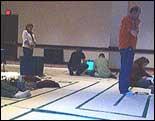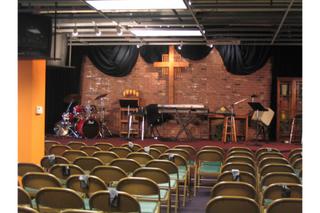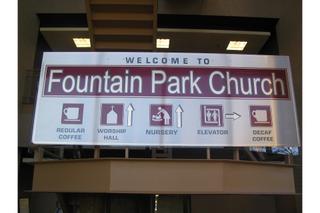I just finished viewing the two part PBS special on the Emerging Church. They are viewable here and here. I felt that both accounts were credible. It did not appear to be a hatchet job on either side. However they made it abundantly clear that there are differences in the two viewpoints.
One of the most striking things about the Emerging Church movement is that it is so diverse and so varied that it is difficult to pin down. What do they believe? The answer is “yes,” it would appear. Before going any further, let me say right up front that in many respects my church falls under the emerging  church banner – whatever that banner is. We do not advertise ourselves by that moniker, nor do we resist it when brought up in regard to us. I have attended some of the Emergent national gatherings, read their materials, and ascribe to a great deal of what they believe Jesus says the church should be about. I visit the web sites often for a kick in the seat of my pants on justice issues or social concerns that many Evangelicals simply overlook. I love the experiential aspect of worship Emerging Churches espouse that probably has seeds in the “Bapticostal” church of my youth.
church banner – whatever that banner is. We do not advertise ourselves by that moniker, nor do we resist it when brought up in regard to us. I have attended some of the Emergent national gatherings, read their materials, and ascribe to a great deal of what they believe Jesus says the church should be about. I visit the web sites often for a kick in the seat of my pants on justice issues or social concerns that many Evangelicals simply overlook. I love the experiential aspect of worship Emerging Churches espouse that probably has seeds in the “Bapticostal” church of my youth.
In many cases I fit better in the Emerging Church mold than I do in the mold of my own denomination, where I have heard my beliefs (especially eschatological beliefs) and my very personhood and character publicly ridiculed. I have not yet heard anyone at an Emerging Church gathering ridicule anyone’s beliefs or character. Now some of the critics will say that this is because the Emerging Church does not believe in Absolute Truth, so there is no right to ridicule. Although there may be some in this broad umbrella that believe that, none in my circle fit that caricature. And that is what I think it is in many cases. If we can say that someone does not believe in Absolute Truth, we have labeled them and they are outside and “not us.” My friends who hold some of the Emerging Church beliefs all believe in Absolute Truth and are probably in the Evangelical Camp for most theological discussions. (I say most because a broad sweeping discussion like this is not easily generalized.)
I resonate with the Emerging Church for a reason that may surprise you. I am by all accounts what the media would call an Evangelical Christian. In my past I was a fundamentalist – a very rigid fundamentalist, well to the right of Jesus, Paul and Peter. As I have matured in my faith, I am 51 years old now; I have fewer answers and more questions. Yet I am more assured about the basic tenants of Christianity than ever before. One of the drawing cards for my acceptance of the Emerging Church is that I find it to be less condemning. I get very weary of having my “card punched” at the latest Evangelical gathering to be sure I am on the right side of whatever their latest issue is.
[Side Bar: I wonder if the early Reformation was not caricatured in much the same way as the Emerging Church leaders are today? Hm-m-m-m.]
However, here is a primary reason I am drawn to a lot of the Emerging Church discussion: I see them as being more missional than where I usually tread. Their compassion and care for the oppressed, their desire to be the church wherever they find themselves resonates with me and my Evangelical heritage. As much as a disjointed movement can appear anything, the Emerging Church really does seek to be the church in whatever venue it finds itself. This does not mean it is without those who are along for an experiential ride. Everything Christian will have "riders" who do not get the true purpose, but are in it for themselves. However, more so than most Christian groups I have been a part of, the Emerging Church does seek to keep the missional element at the forefront and remind adherents of that purpose.
One person who is being lifted up as a speaker for this colletion of churches is Brian McClaren. Please do not quote me as saying I believe everything Brian McClaren teaches. I do not. I don’t believe everything anyone teaches today, me included! I like a lot of what Brian does, but I think he simply raises some issues filling his role as a prophet to call folks to question the status quo. Quite honestly, I think some of what he says, even he does not believe. (Now, do not quote me, he and I have never talked, and probably never will. This is just my take.) My first pastoral mentor told me in 1976, Terry if you believe everything the same way today that you did five years ago, you are backslidden. There is a right and wrong way to question I have learned. Brian loves to push that envelope and thereby freak some folks out.
I have to be honest; the term Emerging Church has become so loaded that it is hard to be used by some of my ministry colleagues who clearly fit here. You can spend time defending yourself rather than advancing mission. I see myself and my church called to be missional first. If we are true to the mission of our local culture and our greater culture, whatever additional label winds up on us, just ends up there.
Wednesday, July 27, 2005
Missional in the Suburbs – Part 5: The Emerging Church
Thursday, July 21, 2005
Missional in the Suburbs: Part 4 - Church Facilities, Land, and Sacred Space
 These recent days have been extremely hectic ones for those of us at our church. We are in the process of moving to a new worship location after our first three years in our present site. This is partly the reason for the time gap in blogging . . . for that, please accept my apologies. It is not my norm. That being said, this worship location move has led to the topic of this blog. Before undertaking my thoughts (which may prove a bit lengthy but, I have not written in a few days) on being missional in the suburbs as it relates to facilities, I have to share what has taken place in the church where I am privileged to serve as pastor.
These recent days have been extremely hectic ones for those of us at our church. We are in the process of moving to a new worship location after our first three years in our present site. This is partly the reason for the time gap in blogging . . . for that, please accept my apologies. It is not my norm. That being said, this worship location move has led to the topic of this blog. Before undertaking my thoughts (which may prove a bit lengthy but, I have not written in a few days) on being missional in the suburbs as it relates to facilities, I have to share what has taken place in the church where I am privileged to serve as pastor.
Fountain Park is a new faith community. I am not the original founding pastor. The original pastor announced his resignation to pursue other ministry six months after the official launch. I arrived here shortly after their first anniversary. The history of my former church (the “mother church” of Fountain Park) and my present church is that both were operated under an attractional model of ministry. I began to have serious questions about that model several years ago and by the time I arrived here had moved almost entirely to a missional model as more apostolic and thereby Biblical. During my entire time here I have been attempting to lead the leaders and congregation into an understanding of what missional ministry actually is. We have discussed, read, studied and attended conferences. Ten leaders attended an all day missional church workshop with Frost and Hirsch. All of this has taken place as we held weekly worship gatherings and attempted to reach out to our community in our present worship location.
Let me tell you about that location. We are located in one of, if not the fastest growing sectors in the state of Pennsylvania. The cost of living here is very high for this part of the country. For a traditional “build it and they will come church,” facilities could eat up a ton of your resources. (Consider $500,000 to $1 million per acre as not out of the realm of possibility on the main corridor.) However, there is a need for a place to gather for worship. And all we have here is new construction and empty farm land. The idea at first was to meet and worship in a rented school facility. The original core group meetings did meet in a school. That did not pan out for official launch for various reasons, so Fountain Park began to use an office building for worship. We actually have a very cool office space modified for worship, but in this corridor it is likewise very expensive. In order to be good stewards of the resources entrusted to us, we felt we must seek an alternate location. That location has been secured. It is a closed down Episcopal Church that we are able to renovate.
meet and worship in a rented school facility. The original core group meetings did meet in a school. That did not pan out for official launch for various reasons, so Fountain Park began to use an office building for worship. We actually have a very cool office space modified for worship, but in this corridor it is likewise very expensive. In order to be good stewards of the resources entrusted to us, we felt we must seek an alternate location. That location has been secured. It is a closed down Episcopal Church that we are able to renovate.
Here is where it really gets interesting in this missional discussion. The ink is not even dry on this paperwork and I have had to take numerous precautions to stop folks from calling this new building “the church.” (We are calling it simply our Worship Center.) Many even called the office rental “the church.” I wanted to take the bridge!
Why is this I asked myself? In reality, I do not blame anyone. There are numerous reasons, but here is a key one: Past experiences die hard. For even the “unchurched” the idea that the building was a church is deeply ingrained. It is something that is far more entrenched into the culture of this region than we care to admit. This is especially true in an area where the Roman Catholic Church claims as much as 1/3 of the church attendees in the area. (I have no axe to grind here, it is just a reality in my culture. Was it Kevin Crawley on his blog who said, being missional is exegeting the culture?) A much as I say I am reaching the unchurched I think in reality de-churched is probably a better term here. These “de-churched” folks as well as churched folks, who choose to be a part of us, all bring their former church to our location. It is hard to remind them that we are not recreating their former church, no matter what it was like.
Before this facility came into being in our life, I was asking this question over a cup of coffee with another missional pastor friend here. “Is it even possible to do missional ministry in the suburbs without a facility?” I am increasingly beginning to think the answer to that question is “no.” When reaching the 2.3 kid families, the suburban single parent and the empty nester here, it quite simply may take a “place.” It may not, but for us it may. There seems to be deep within the heart of the suburbanites in the US a deep longing for “sacred space.” Their lives are so incredibly busy that they are dying for some respite. That is why they have the country home, or the lake home, or the beach home, or just go camping. They are dying for a break from the rat race they have allowed themselves to fall into. (I will resist the urge to argue about the “hurried child” or the “living out daddy or mommy’s dream” syndrome here. But I will pick that topic up in the future!) Many have forgotten that the “up and outer” need Jesus just as much as the “down and outer.” And if we can help these get a vision for the poor and oppressed what kind of impact could we expect?
But what  kind of a sacred space does it take? Do we really need a mammoth cathedral? Not that it is wrong, but do we need it? I am so much “less is more” when it comes to facilities and buildings. I see the needs in Africa and up the street from my home and I say “Should our money not go there?” But in reality, doing much of the outreach sort of stuff (read “missional” here) that is required in a suburban setting requires a place to do it. That means a building of some sort or another.
kind of a sacred space does it take? Do we really need a mammoth cathedral? Not that it is wrong, but do we need it? I am so much “less is more” when it comes to facilities and buildings. I see the needs in Africa and up the street from my home and I say “Should our money not go there?” But in reality, doing much of the outreach sort of stuff (read “missional” here) that is required in a suburban setting requires a place to do it. That means a building of some sort or another.
This has gone on far too long, but here is what I envision for Fountain Park in the future. We would like the present facility we are acquiring to become a youth outreach facility while we build a worship location somewhere else, a couple miles away. I then see us owning some land to build ball fields that are loaned to the community at no charge for their sports activities. We do not have a campus in one location; instead we have a presence in the entire community that is offering something. Some of this offering is similar to the church of modernity. (Let’s not throw the baby out with the dirty bath water.) We intend to allow community groups, support groups, etc. all over the facilities. Why not support AA, NA, Al Anon, Alateen and Jazzercise as we seek new ways to connect in and with our community? Could this not become an element of being missional that reaches men and women where they are? Could this allow our worship location to become a third place for some folks? Is this wrong if it can lead others to Jesus? Is this not a missional expression of the suburban church? At present, I am having a hard time answering that question with anything other than an affirmative answer.
water.) We intend to allow community groups, support groups, etc. all over the facilities. Why not support AA, NA, Al Anon, Alateen and Jazzercise as we seek new ways to connect in and with our community? Could this not become an element of being missional that reaches men and women where they are? Could this allow our worship location to become a third place for some folks? Is this wrong if it can lead others to Jesus? Is this not a missional expression of the suburban church? At present, I am having a hard time answering that question with anything other than an affirmative answer.
Saturday, July 16, 2005
Missional in the Suburbs: Part 3 - Soccer Balls and Starbucks
 In many (not all) missional discussions, the suburbs catch a lot of grief. I am convinced most of it is unintended, for I do not know of a single person doing missional ministry that would imply that it is an urban issue. The same is true for it being a suburban issue or a rural issue or a racial / ethnic issue. Missional ministry is a kingdom issue. It crosses ALL boundaries.
In many (not all) missional discussions, the suburbs catch a lot of grief. I am convinced most of it is unintended, for I do not know of a single person doing missional ministry that would imply that it is an urban issue. The same is true for it being a suburban issue or a rural issue or a racial / ethnic issue. Missional ministry is a kingdom issue. It crosses ALL boundaries.
That being said, my thoughts on the subject are still swirling around at the present. I have read the blogs of some others that are positively contributing to the mental flow. As I continue down this journey of what exactly it is to be missional in a suburban context, I did not want things to sit stale over the weekend, even if it is an incredibly busy one. So, I thought I would take a bit of time to talk in non-theological language about a couple of examples of being missional in the context that are purely pragmatic.
Frost and Hirsch, and others, take considerable pain to discuss the importance of the “third place” in the missional construct. Although hanging out at bars is a lot of fun, where I am placed it would be less that productive. There are options there, but as my Dad used to say, “I don’t understand everything I know about that.” But, here are a couple of things I have come to know.
A major “third place” in our setting is youth sport’s leagues. They are absolutely huge. I am astounded how many dads think their son is the next major league superstar. Oddly, they all criticize other Dads who feel the same way. (Smile here.) Earlier this year I began to feel that a major missional door was open to me in the sports leagues. Why should I not offer to coach a team? I have no children of that age, but it would still allow me to give back to the community without asking for anything. Therefore I became the coach of a girl’s under ten soccer team. (Read about it here in the March 9 entry.) It was an absolute blast! I got to know the girls, and through their daughters I was able to interact with parents. We did not have evangelistic prayer meetings after practice. In fact we never even prayed after practice. (Horrors! A pastor who refused an opportunity to pray in public!)
One of “my girls” was injured at home one day. When her mom informed me of the injury, I told her that I would pray for her. I later found out that that simple statement was HUGE for that girl. They knew I was a pastor, although I never did flaunt it, so she asked her mother if she thought I really would pray for her. Her mom said, “yes,” and well . . . I did. In so doing a relational connection was built. I may or may not ever see the fruit of that, but I am convinced it will bear fruit. After all, I am not the only instrument God has at work in this equation.
A second location where I am seeing good movement in missional suburbia is at  the local Starbucks. I am there often to work or meet folks so I am becoming known, not only to workers but also to customers. What am I doing? I am seeking to be in a third place to give relational mission an opportunity to take place.
the local Starbucks. I am there often to work or meet folks so I am becoming known, not only to workers but also to customers. What am I doing? I am seeking to be in a third place to give relational mission an opportunity to take place.
Before I conclude this series of blogs I will share at least several other practical examples of where we are learning as a community of faith what it means to be missional. Part of that will be our leadership vision, our new worship location, and other community involvement opportunities we are exploring. This road may not be a newly paved one, but it is fun to travel. It is likewise cool to look around and see cohorts!
Wednesday, July 13, 2005
Missional in the Suburbs: Part 2 - Preview of Coming Attractions

A few weeks ago I spent several days with six friends of mine. During the days surrounding this trip I saw three movies. I was able to see Batman Begins, Star Wars and War of the Worlds. (I rate Batman the best of the three, but that is neither here nor there.) I am not sure why, but I am always amazed at how many previews there are in the theaters. A preview has as its sole purpose to get you to come see the upcoming movie.
It dawned on me that most churches today operate with that same procedure. We are guilty of sharing our “coming attractions” as a way of hoping others will join us for our “upcoming movie.” We even have a marketing strategy for our churches. Now do not misunderstand me, I am not saying that is ALL bad. My church does “marketing.” We do it primarily to encourage and support our folks in living their lives in the community. But I must admit, every time we talk about inviting someone to worship, my mind does a double take as to whether or not that is where our focus should be. I think the answer in a suburban context may be “yes, but not exclusively.” (More on that in the days to come.)
Fountain Park (the faith community I serve) is in the process in the upcoming days of completing the negotiations that will give us a new location for our weekend worship. A major part of this process includes the look of the facility in the community we find ourselves. This has caused my mind to go several directions. Most of the questions are related to the concept of being missional in the suburbs. Can you even do missional ministry in the suburbs without a facility? (I am beginning to think the answer to that may be negative, but more on that in future days as well.)
Most of the reading you do on the missional church has a distinctively urban flavor. But that is not the only place where missional should come into play is it? I asked two of the most respected authors today what their view of being missional in the suburbs would look like and I was surprised to see them hesitate in their answer. The answer that finally came was a spin off of being missional in an urban enviroment. Is this an issue that no one else has been asking? Do some of the best minds in the world not think it is possible to be missional in a suburban setting? Is this not an issue that we should be asking? (I know I intend to keep asking it.)
I am in no way wanting these upcoming blogs to be a defense of urban flight, or a defense of living in the protected environment of the suburbs, although that in and of itself may not be inherently right or wrong. I am simply saying it is a suburban setting where Fountain Park Church finds itself. If we believe the missional church is Biblical, apostolic and God honoring, and we do, we need to ask ourselves how we go about this in a suburban context that is distinct from and/or similar to an urban environment.
No answers yet. I am still asking the questions. But the answers must be forthcoming. They simply must.
Monday, July 11, 2005
Missional in the Suburbs: Part 1 - Don't Go to Church

If you read very much regarding church patterns and cultural interaction, at some point you will come upon the phrase “missional” as it relates to the church. As simple as that phrase should be, there is a great deal of baggage associated with it. Much of that baggage comes from the modern church’s use of the word “missional.”
In modernity, most of the church allowed the word to be reduced to reference to missionaries on foreign soil and US churches sending them money. (Okay, it is a bit more complicated than that, but that is the essence.) The Emerging Church in America is seeking to change that. We wish to reclaim the use of the word “missional,” to its right and true use. I actually wish there was another word that we could use to convey what we truly mean when we say being “missional,” but in reality, there is not. The word properly understood is exactly what we are about.
When you attend Fountain Park Church or any other Emerging Church’s worship gathering, you will probably hear the word missional thrown around. Here is what we mean. We are talking about taking Jesus into the world seven days a week, in our neighborhoods, to our work places, on our recreation events, hanging out with our friends, at concerts, mowing the lawn, . . . well you get the point. Being missional is truly about being Jesus with skin on all the time. It is no longer about being so attractive as a church that people will want to join. It is being so attractive as a follower of Jesus that people will want to know him. Being involved in a local faith community (like Fountain Park) is an outgrowth of the goal, not the goal itself.
A good pastor friend of mine has a shirt that reads, “Don’t go to church” on the front. The back reads, “Be the church.” That is being missional.
Tomorrow I want to address what I experience as a pastor of a suburban church seeking to lead my folks into a missional spirituality. It continually stirs me. I hope it will stir you.
Wednesday, July 06, 2005
Atrophy
While visiting with a friend of mine recently, I asked him about his wife. She is a relatively young 50 year old. However she suffers from osteoporosis. This can be devastating on some women. She is one such case. About 18 months ago she broke her hip. The recovery has been a long and very difficult road. She is currently about 80% healed. This healing has come in plateaus of which the 80% plateau has seemed to take a long time. The other issue she is wrestling with is the issue of muscle atrophy. She has always been a very active person, and to have this issue has been extremely difficult.
Atrophy sets in from a lack of use. I recall being hospitalized for a week many years ago and being astounded how quickly the muscles lose their functionality when not in use. The only way a muscle grows is to use it. The way it becomes stronger is through use. The way it increases flexibility is through use.
How about our spiritual muscles? Are we using them? Are we praying? If not, do we lose our “edge?” Are we reading and studying Scripture? If not are we losing ground?
How about our church? How about any church in their community involvement and engagement? Folks from our church spent most of the 4th at a local community day being visible and supporting the community. We are doing the same at an upcoming Cancer Fund Raiser and awareness event and at another charity event in our area. If we do not practice being “missional” in our community, our muscles in this area begin to atrophy. We lose our “edge,” as it were. We easily forget why we are here. I can name a hundred churches that are now seeking to survive rather than advance into the community. Their muscles have atrophied. Their entire existence is based upon what they want or need instead of those on the outside being welcomed in.
We are not here to serve ourselves. We are here to reach and help others. Everything we think of in relation to the church (prayer, worship, etc.) can be done better in heaven than on earth with the single exception of reaching out to others and providing care for their physical, emotional and spiritual needs. Let’s not let our muscles in this arena atrophy or we easily lose our reason for existing as a church. The only way we stave off atrophy is through use. The implications are many.

